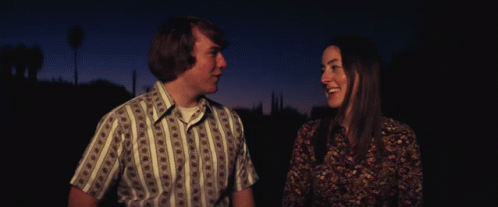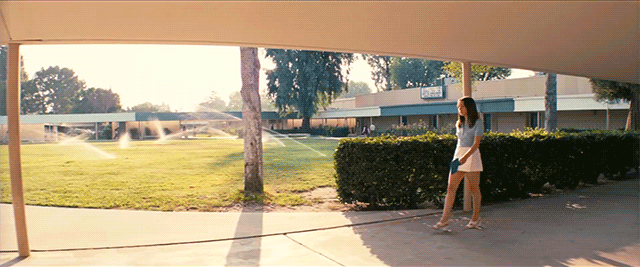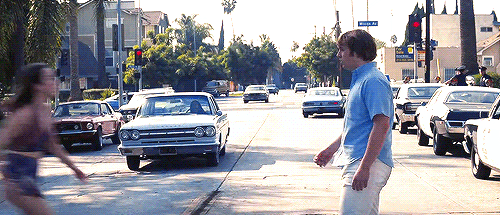Ups and downs. Incredible highs that lead to either disappointing conclusions, or no conclusions at all. Paths without directions, and naive illusions of reality. Paul Thomas Anderson’s Licorice Pizza is the most mature coming-of-age story out there, for the sole reason of how much it respects its main characters.
To quickly put down Alana’s claim about the world not revolving around Gary, the film quite literally does (but around him and Alana, rather). From a literal, structural perspective, the movie is a mess to the eye of someone who can’t see this movie as anything other than a straightforward “rom-com,” which it is not. But a closer look at what point-of-view the movie is being told through says otherwise.
The vignettes throughout the movie serve as nothing more than transitional moments for these two main characters. Gary’s acting gigs mean little in the grand scheme of the story, even though the prestige of being an actor is made out to be his defining trait. Fat Bernie’s Waterbeds amounts to nothing, as does Alana’s audition as Rainbow. The part with the unstable, tail-chasing character played by Bradley Cooper is a fun and memorable segment, but the conflict he brings to the story is only intended to move the characters from one scene to the next. Even Gary’s age-appropriate love interest is nothing more than an attempt to make Alana jealous, which means as little as everything else he tries to impress/bait her with. Some may call these parts of the movie “plot devices,” but I think that the added context of these points in the film—which are almost dream-like at times—being reflective of the impulsive and uncertain mindsets of Alana and Gary, which are lacking of any trajectory, no matter how much they convince themselves otherwise, brings out the most meaningful intentions of the filmmaker.
Sure, the ending sees Alana saying “I love you, Gary,” but it is not the type of love one might expect out of a “love story” like this. Even when Alana kisses Gary at the end, there’s not much of a romantic feeling as there is a fantastical one associated with it. Instead, the embrace at the end is about how two people at different stages in their lives, who are facing the same blank slate of a future, have found that being with one another allows them to enjoy being in the moment. Gary doesn’t need to open up a new business at any given turn, just as Alana doesn’t need to feel like she has everything figured out at every point in time. Nevertheless, they teach each other how ambition has its limits, and how letting spur-of-the-moment emotions dictate every decision doesn’t always bring upon a lasting happiness.
“What’s the point of anything in this movie? Every twenty minutes, something is set up, and then immediately dropped from the story.” That’s not only done on purpose, but it’s the entire message of the movie; there’s so much out there in the world, but how do we find our place in it? These small, ultimately meaningless scenes are more than scenarios with crazy characters — they are meant to show that just as these moments are set aside in the movie’s story, they become irrelevant to Alana’s and Gary’s lives, too. But, they just don’t know it right away; they’re both so strung up on the possibility of everything in their grasp, that they become overconfident and end up losing out. This is why the Sean Penn/Tom Waits and Bradley Cooper plot lines are so over-the-top; they present an opportunity to the main characters—one through an unrealistic Hollywood lens—and Gary and Alana are left stranded, and back where they started. No matter how theatrical the more zany moments are, the movie never lets its feet too far off the floor, and remains grounded until the end.
The misdirections left and right put us into the headspace of Alana and Gary, who are convinced of success several times throughout Licorice Pizza’s runtime, only to be left with nothing more to do than move on to the next venture ahead of them. Even though these exciting developments are a phone call away at times, Alana and Gary are constantly ahead of themselves, as much as these opportunities are far away from leading to enduring victories.
Gary thinks that being a big-time actor with lots of money will make him happy. He thinks that cashing in on the arrival of the waterbed to the public will prove him to be a smart businessman. These are chances for Gary to finally show the world his talents. Alana thinks that becoming a “politician” will solidify her as an adult who is above the 15-year-olds she hangs out with. But who are these two characters proving anything to, other than to themselves? That’s exactly it, isn’t it? By making themselves feel valuable to the world around them, they feel valued. This is shown no clearer than in the scene in the restaurant, in which Alana is prompted by coverage on the oil shortage to ask Gary how much he actually knows about the real world. The barrier they have to overcome, though, is how they can fulfill a purposeful life, while staying true to themselves, and avoiding flying too close to the sun.
The bottom line is that Alana needed excitement in her life, and Gary was her only gateway to finding a purpose. Although Alana sees herself as an adult, she’s jealous of this 15-year-old kid’s success, and doesn’t have her path in life figured out any more than Gary’s, and an argument could be made that she’s even more lost. The movie leaves us with two characters who leave two different parts of their life—the campaign and the arcade—behind them, running along the pavements of the unpredictable world around them, and into each other’s open arms. Even so, they still don’t always land on their feet, and we see them physically clash with each other, but still there to pick each other up.
Licorice Pizza reminds me of why I love movies, and how such a simple story can have such a profound impact, by way of the magic touch a filmmaker like Paul Thomas Anderson can provide.
8/20/22







